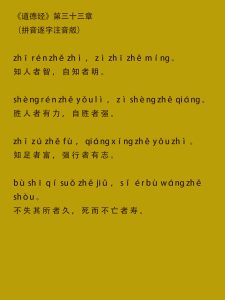Tao Te Ching Chapter 33

1. Classical Chinese Original
知人者智,自知者明。
胜人者有力,自胜者强。
知足者富。
强行者有志。
不失其所者久。
死而不亡者寿。
2. Pinyin Transcription
Zhī rén zhě zhì, zì zhī zhě míng.
Shèng rén zhě yǒu lì, zì shèng zhě qiáng.
Zhī zú zhě fù.
Qiáng xíng zhě yǒu zhì.
Bù shī qí suǒ zhě jiǔ.
Sǐ ér bù wáng zhě shòu.
3. Structural Analysis
Section 1: Cognitive Dimensions
- 知人者智 (Knowing others: wisdom)
- External cognition
- Social intelligence
- 自知者明 (Knowing self: enlightenment)
- Internal realization
- Self-awareness
Section 2: Power Dynamics
- 胜人者有力 (Conquering others: strength)
- Physical dominance
- Competitive advantage
- 自胜者强 (Conquering self: true power)
- Self-mastery
- Emotional regulation
Section 3: Virtue Framework
- 知足者富 (Contentment: true wealth)
- Anti-materialism
- Inner abundance
- 强行者有志 (Perseverance: willpower)
- Sustained effort
- Purpose-driven action
Section 4: Temporal Dimensions
- 不失其所者久 (Holding essence: endurance)
- Authenticity
- Core stability
- 死而不亡者寿 (Deathless: true longevity)
- Legacy
- Spiritual immortality
4. Comparative Commentary
- Confucian Contrast: Focus on self-cultivation vs. social harmony
- Buddhist Parallel: 自知 ≈ 自觉 (self-awareness)
- Modern Psychology: Aligns with emotional intelligence theories
5. Key Term Glossary
| Chinese | Pinyin | English | Philosophical Concept |
|---|---|---|---|
| 明 | míng | Enlightenment | Higher consciousness |
| 强 | qiáng | True power | Self-mastery |
| 富 | fù | True wealth | Non-material abundance |
| 寿 | shòu | True longevity | Timeless influence |

One Comment